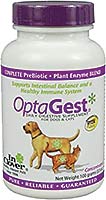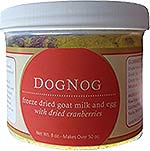Dysbiosis and Leaky Gut Syndrome are two names for the same disorder. However, definitions for each are somewhat different, which makes things unnecessarily confusing. Dysbiosis is often defined as an imbalance of gut bacteria - too few friendly bacteria and too many opportunistic or pathogenic (bad) bacteria. Leaky gut syndrome is defined as the inability of the intestinal lining to prevent undigested food particles or potentially toxic organisms from passing into the bloodstream.
It’s simpler to look at the situation this way: the imbalance of bacteria is what causes the problem, inadequate supplies of good bacteria, plus an overgrowth of bad bacteria, and sometimes yeast. This bacterial imbalance leads to inflammation of the membranes of the intestine, which results in the condition known as dysbiosis or leaky gut syndrome.
Leaky gut syndrome is an increasingly widespread condition in dogs and is exactly what it sounds like. The delicate intestinal mucosa that lines the gut and allows tiny digested nutrients to pass through the blood stream can be likened to cheesecloth or a tea strainer. This is how nutrition is assimilated into the body, but this lining also acts as an important barrier to toxins, pathogens and undigested food particles. The mucosa becomes traumatized and inflamed, causing the junctions (the spaces in the cheesecloth) to become stretched or damaged to the point where they are no longer able to filter out larger food particles, bacteria and toxins.
These substances can now pass through the intestinal wall and make their way into the blood stream and lymphatics. This sets off a series of events in your dog’s body, which begins with the liver working over-time to screen out the particles; it has no chance of keeping up with the onslaught, and the pathogens begin to accumulate. The immune system is then triggered to fight the intruders, but it too becomes overwhelmed, leading to particles being absorbed into body tissues.
This causes inflammation; but even worse, the immune system can attack these intruders, which can lead to autoimmune disease. The body starts to perceive food as its enemy, the reason we see so many dogs that are allergic or reactive to almost every protein and many vegetables and grains. This leaves little to choose from when it comes to feeding, in addition to the challenges of allergies to grass, pollen and more; but importantly the result is an animal that is in a chronic and constant state of inflammation and distress.
There are many causes of leaky gut syndrome. The three primary causes are… 
Poor Diet - specifically feeding your dog a species inappropriate diet of highly processed, grain based foods containing wheat, rice, spelt and soy, food additives and preservatives; the lectin found in un-sprouted grains; sugar; genetically modified foods (GMOs); pasteurized dairy; and meat from stressed factory-farmed animals. So, the resulting mix is a brew of chemically altered proteins that are very difficult to digest, process, and assimilate.
Drugs and Other Toxins - Many pets these days – very early in life – are unfortunately given antibiotics. These are either topical or oral antibiotics prescribed for really minor, insignificant things, most of which could be resolved with natural substances. To make matters worse, often additional medications like corticosteroids such as prednisone, or NSAIDs are administered along with antibiotics. These drugs exacerbate the gut problems created by the antibiotics. This category includes the unnecessary use of steroids, non-steroidal anti-inflammatories (NSAIDs), deworming drugs, flea and tick treatments that often contain pesticides.
Over vaccination - When the body is forced to respond to a vaccine to which it has already established antibodies; this wreaks havoc on the immune system and cause a number of chronic diseases.
Stress – Chronic stress or boredom can also influence the gut’s health. Not getting enough exercise or mental stimulation, or being left home alone for long periods, can be a major cause of stress for a pack animal. Stress negatively affects the immune and digestive systems.
You can see trauma in a joint by watching your dog limp or on the skin as a lesion or wound. But gut trauma is hidden trauma and we can’t fix what we can’t see. Because it is left untreated and unhealed, it becomes more chronic and more dangerous to your dog’s overall health. You start to see symptoms that in conventional medicine are diagnosed as a disease or infection. Treatment begins for that disease and the wheel starts spinning, you see the symptoms disappear but then they return.
A recurring ear infection may clear up, but then the dog suffers disorders like hot spots, full blown allergies or hypothyroidism. In many case this is because the initial trauma causing the disease – leaky gut syndrome – is not healed … because you can’t see it.
Leaky gut syndrome appears in the form of many chronic diseases that plague our dogs. Examples include (but are not limited to):
Diseases of the skin – allergies, thyroid, joints, heart disease, spinal cord, eyes or brain.
Inflammatory bowel disease, interstitial and chronic cystitis, collapsing trachea, laryngeal paralysis, liver, gallbladder and pancreatic disorders.
Behavior problems - aggression and obsessive-compulsive disorders or self-mutilation.
Autoimmune disease - nutritional deficiencies, which left untreated, could lead to some forms of cancer because of the chronic inflammation.
Your dog’s gut is responsible for more than 70 percent of their immune system and is directly responsible for the absorption of all that food you are feeding them. With an unhealthy gut, no amount of raw food nutrients will support their health and longevity, let alone heal something like an allergy.
Leaky gut syndrome treatment involves addressing food allergies and intolerances, as well as any underlying nutritional deficiencies caused by malabsorption or inefficient digestion. Appropriate probiotics, enzymes, and nutraceuticals must be prescribed to help reduce inflammation in the GI tract. Probiotics are an extremely important part in the treatment of leaky gut syndrome. They reseed your pet’s gut with good bacteria and prevent an overgrowth of bad bacteria, which returns the intestine and mucosal lining to good health.
However, there are many different types of probiotics, each having its own merit and benefit. Some animals can’t tolerate milk-based probiotics. Some animals can’t tolerate probiotics derived from yeast cultures or even certain strains of non-dairy organisms -- hence the importance of working with a veterinarian that understands all of these different facets of leaky gut syndrome.
In general, removing highly processed, high-stress foods from a sick pet’s diet in favor of a balanced species-appropriate, low-stress diet, plus appropriate supplements to address inflammation and yeast, if necessary, and support of other organ systems including the liver and pancreas, can relieve symptoms, address the root cause of the leaky gut, and get the pet on the road to recovery.
Leaky gut syndrome can be prevented when you stop feeding processed foods and feed a raw, species appropriate diet. Stop routine vaccinations; instead ask your vet for blood titer tests to measure antibody levels. Get a copy of the results and ask a vet to interpret them, as there are differing opinions on what the results actually mean. Stop using chemical flea and tick products that contain pesticides. Use natural products and protocols with proven success, we recommend Buzz for Bugs. Stop all drugs where possible, but consult with your vet first. Determine your dog’s source of stress, make the time to go for longer walks or hire a dog walker or someone to check in on them during the day or even add a playmate. |